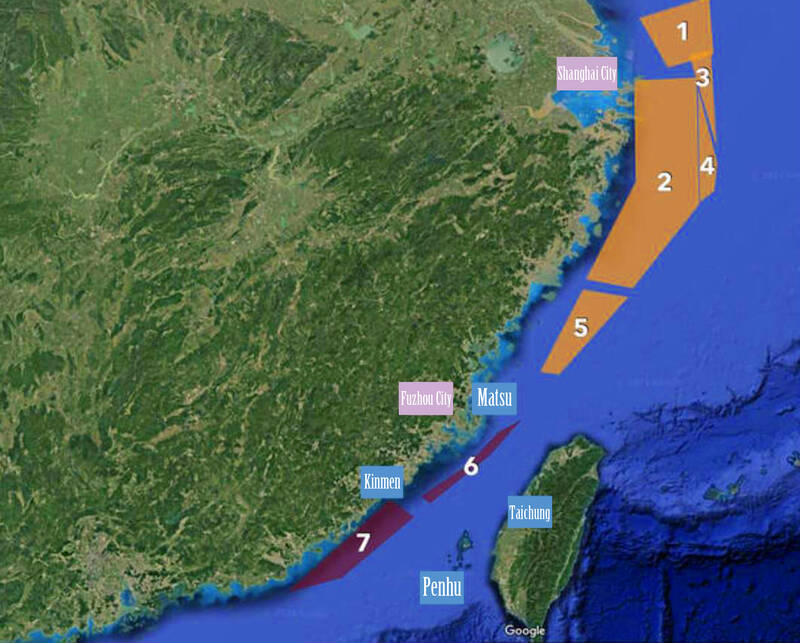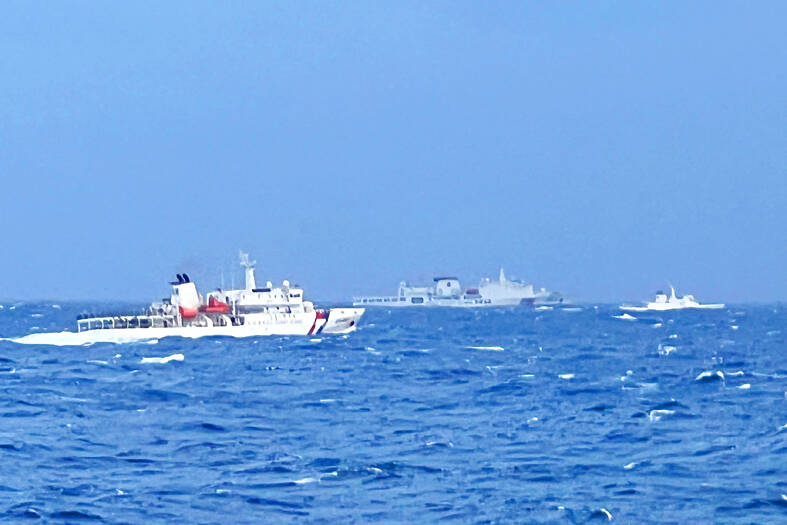The Taiwanese military is on high alert and is closely monitoring the Chinese People’s Liberation Army’s (PLA) air and naval deployments after Beijing yesterday reserved seven airspace areas east of its Zhejiang and Fujian provinces through Wednesday.
Beijing’s action was perceived as a precursor to a potential third “Joint Sword” military exercise, which national security experts said the PLA could launch following President William Lai’s (賴清德) state visits to the nation’s three Pacific allies and stopovers in Hawaii and Guam last week.
Unlike the Joint Sword military exercises in May and October, when Beijing provided detailed information about the affected areas, it has yet to formally announce any planned military drills.

Illustration: Taipei Times
The Chinese Ministry of Foreign Affairs declined to answer when asked about launching military drills in response to Lai’s overseas trip, with spokeswoman Mao Ning (毛寧) simply reiterating the importance of Chinese sovereignty and maintaining Chinese territorial integrity.
While the previous two exercises focused on drills by the PLA’s Eastern Theater Command, Taiwan’s Ministry of National Defense said its intelligence had identified naval formations not only in the Eastern Theater Command, but also in the Northern and Southern Theater Commands.
The ministry added that it had detected China Coast Guard vessels entering areas around the Taiwan Strait and Western Pacific.

Photo: AFP / CGA
The Chinese aircraft carrier Liaoning joined the second Joint Sword military exercise in October. Whether the carrier would join a third one remains to be seen.
Another difference about the anticipated drills is the area covered by the seven reserved airspace zones, which range from Shanghai in the north and Shantou in the south, with two of the zones close to Kinmen and Lienchiang (Matsu) counties.
The defense ministry said that it has initiated combat-readiness drills at strategic locations nationwide and was working closely with the Coast Guard Administration (CGA) on appropriate countermeasures.
The CGA said it has detected “unusual activities” by several Chinese coast guard vessels in waters around Taiwan since Friday, including three last week and four yesterday.
Last week, the China Coast Guard ship No. 2901 navigated through waters south of the Taiwan Strait, while No. 1301 and No. 1302 ships navigated southward via waters off Taiwan’s northeast coast, the CGA said.
All three eventually gathered at about 50 to 60 nautical miles (93 km to 111km) off the northeast coast of Green Island on Taiwan’s east coast.
Yesterday, China Coast Guard vessels 2203, 2302, 2304 and 2307 navigated toward waters off Taiwan’s southwest coast, the CGA said.
None of them entered Taiwan’s restricted waters, it added.
Using a one-on-one approach, the CGA also dispatched seven ships to closely monitor the whereabouts of the China Coast Guard ships, it said.

A Ministry of Foreign Affairs official yesterday said that a delegation that visited China for an APEC meeting did not receive any kind of treatment that downgraded Taiwan’s sovereignty. Department of International Organizations Director-General Jonathan Sun (孫儉元) said that he and a group of ministry officials visited Shenzhen, China, to attend the APEC Informal Senior Officials’ Meeting last month. The trip went “smoothly and safely” for all Taiwanese delegates, as the Chinese side arranged the trip in accordance with long-standing practices, Sun said at the ministry’s weekly briefing. The Taiwanese group did not encounter any political suppression, he said. Sun made the remarks when

The Taiwanese passport ranked 33rd in a global listing of passports by convenience this month, rising three places from last month’s ranking, but matching its position in January last year. The Henley Passport Index, an international ranking of passports by the number of designations its holder can travel to without a visa, showed that the Taiwan passport enables holders to travel to 139 countries and territories without a visa. Singapore’s passport was ranked the most powerful with visa-free access to 192 destinations out of 227, according to the index published on Tuesday by UK-based migration investment consultancy firm Henley and Partners. Japan’s and

BROAD AGREEMENT: The two are nearing a trade deal to reduce Taiwan’s tariff to 15% and a commitment for TSMC to build five more fabs, a ‘New York Times’ report said Taiwan and the US have reached a broad consensus on a trade deal, the Executive Yuan’s Office of Trade Negotiations said yesterday, after a report said that Washington is set to reduce Taiwan’s tariff rate to 15 percent. The New York Times on Monday reported that the two nations are nearing a trade deal to reduce Taiwan’s tariff rate to 15 percent and commit Taiwan Semiconductor Manufacturing Co (TSMC, 台積電) to building at least five more facilities in the US. “The agreement, which has been under negotiation for months, is being legally scrubbed and could be announced this month,” the paper said,

MIXED SOURCING: While Taiwan is expanding domestic production, it also sources munitions overseas, as some, like M855 rounds, are cheaper than locally made ones Taiwan and the US plan to jointly produce 155mm artillery shells, as the munition is in high demand due to the Ukraine-Russia war and should be useful in Taiwan’s self-defense, Armaments Bureau Director-General Lieutenant General Lin Wen-hsiang (林文祥) told lawmakers in Taipei yesterday. Lin was responding to questions about Taiwan’s partnership with allies in producing munitions at a meeting of the legislature’s Foreign Affairs and National Defense Committee. Given the intense demand for 155mm artillery shells in Ukraine’s defense against the Russian invasion, and in light of Taiwan’s own defensive needs, Taipei and Washington plan to jointly produce 155mm shells, said Lin,